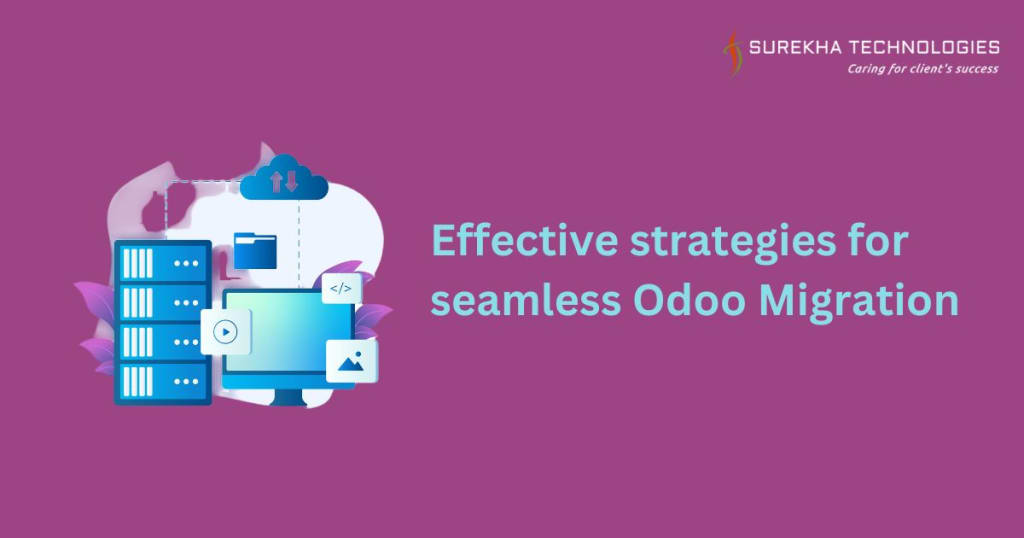Effective strategies for seamless Odoo Migration
Proven Approaches to Ensure a Smooth Transition to Odoo

Migrating an ERP system is a complex and critical task for any organization, and Odoo is no exception. Whether you’re moving from an older version of Odoo or transitioning from a completely different ERP system, the migration process requires meticulous planning and execution to avoid disruption to business operations. This blog outlines effective strategies for seamless Odoo migration, ensuring a smooth transition and minimal downtime.
Understanding Odoo Migration
Odoo migration involves transferring data, customizations, and workflows from your existing system to a newer version of Odoo or a different ERP. This process is crucial for leveraging the latest features, improving performance, and maintaining support. A well-executed migration can result in enhanced efficiency, better user experience, and increased scalability.
Key Strategies for Effective Odoo Migration
1. Comprehensive Planning
- Assessment and Analysis: Start by conducting a thorough assessment of your current system. Identify the modules, customizations, and data that need to be migrated. Analyze the complexity of the migration process and potential challenges.
- Set Clear Objectives: Define the goals and objectives of the migration. Whether it's performance improvement, leveraging new features, or ensuring better compliance, having clear objectives will guide the migration process.
- Develop a Migration Plan: Create a detailed migration plan that outlines the steps, timelines, resources required, and potential risks. Include key milestones and deliverables to track progress.
2. Data Preparation and Cleansing
- Data Audit: Conduct a comprehensive audit of your data to identify redundant, obsolete, or duplicate records. Cleanse the data to ensure only relevant and accurate information is migrated.
- Data Mapping: Map the data fields from your existing system to the new Odoo system. This step is crucial to ensure that all data is correctly transferred and no critical information is lost.
- Data Backup: Before initiating the migration, ensure that you have a complete backup of your existing data. This acts as a safety net in case something goes wrong during the migration process.
3. Customization and Configuration
- Customization Analysis: Review all customizations in your current system. Determine if they are still needed in the new version and if they align with Odoo’s capabilities. Some customizations may be obsolete or can be replaced with standard Odoo features.
- Configuration of Modules: Configure the Odoo modules to match your business requirements. This involves setting up workflows, permissions, and other configurations to ensure the system operates smoothly post-migration.
- Testing Customizations: If customizations are necessary, develop and thoroughly test them in the new Odoo environment. This helps in identifying any potential issues early on.
4. Pilot Testing
- Create a Test Environment: Set up a test environment that mirrors your production environment. This will be used for testing the migration process without affecting live operations.
- Conduct Pilot Migration: Perform a pilot migration on a subset of data and customizations. This helps in identifying any issues and refining the migration process before the full-scale migration.
- User Acceptance Testing (UAT): Involve key users in the testing phase. Their feedback is crucial to ensure that the new system meets business requirements and that they are comfortable with the changes.
5. Training and Change Management
- User Training: Provide comprehensive training to all users on the new Odoo system. This includes training on new features, workflows, and any changes in processes. Well-trained users are critical for a successful migration.
- Change Management: Address the human aspect of migration by managing change effectively. Communicate the benefits of the new system, address concerns, and involve users in the process to gain their buy-in.
- Documentation: Develop detailed documentation of the new system, including user guides, process manuals, and FAQs. This serves as a reference for users and helps in resolving issues quickly.
6. Full-scale Migration
- Schedule Migration: Plan the migration during a period of low activity to minimize disruption. Communicate the migration schedule to all stakeholders to ensure they are prepared.
- Execute Migration: Execute the migration process as per the plan. Monitor the process closely and be ready to address any issues that arise. Ensure that data is accurately transferred and customizations are functioning as expected.
- Post-Migration Support: Provide immediate support after migration to address any issues that users might face. This helps in stabilizing the system and ensures business operations continue smoothly.
7. Post-Migration Review and Optimization
- Review and Evaluation: Conduct a thorough review of the migration process. Evaluate what went well and identify areas for improvement. This helps in refining your approach for future migrations.
- System Optimization: Optimize the new Odoo system based on user feedback and performance metrics. Fine-tune configurations, workflows, and customizations to ensure optimal performance.
- Ongoing Monitoring: Implement ongoing monitoring to identify and address any issues that may arise post-migration. Regularly review system performance and user feedback to ensure continuous improvement.
Tools and Resources for Odoo Migration
- Odoo Migration Scripts: Utilize Odoo’s official migration scripts and tools. These are designed to streamline the migration process and ensure compatibility with the new version.
- Third-Party Tools: Consider using third-party migration tools that offer additional features and functionalities. These tools can simplify data migration, automate tasks, and provide better error handling.
- Expert Assistance: If your migration is complex, consider seeking assistance from Odoo partners or consultants. Their expertise can help in navigating challenges and ensuring a successful migration.
Common Challenges and How to Overcome Them
- Data Integrity Issues: Ensure that data mapping is accurate and perform thorough data validation post-migration to maintain data integrity.
- Customization Conflicts: Analyze customizations carefully and test them extensively in the new environment to avoid conflicts.
- User Resistance: Address user concerns through effective change management and provide adequate training to ensure a smooth transition.
- Downtime and Disruption: Plan the migration during off-peak hours and have a rollback plan in place to minimize downtime and disruption.
Conclusion
Odoo migration is a critical process that requires careful planning, execution, and post-migration support. By following the strategies outlined in this blog, organizations can ensure a seamless migration, leverage the benefits of the new system, and achieve their business objectives. Remember, the key to a successful Odoo migration Services lies in meticulous planning, thorough testing, effective training, and continuous monitoring. With the right approach and resources, your migration journey can be smooth and successful, setting the foundation for improved efficiency and growth.
About the Creator
Surekha Tech
Surekha Technologies is a leading development and consulting company in California, USA. We offer end-to-end services For Digital Portal platform, Liferay, Odoo Development, Enterprise Mobile Applications Development.
Enjoyed the story? Support the Creator.
Subscribe for free to receive all their stories in your feed. You could also pledge your support or give them a one-off tip, letting them know you appreciate their work.






Comments
There are no comments for this story
Be the first to respond and start the conversation.